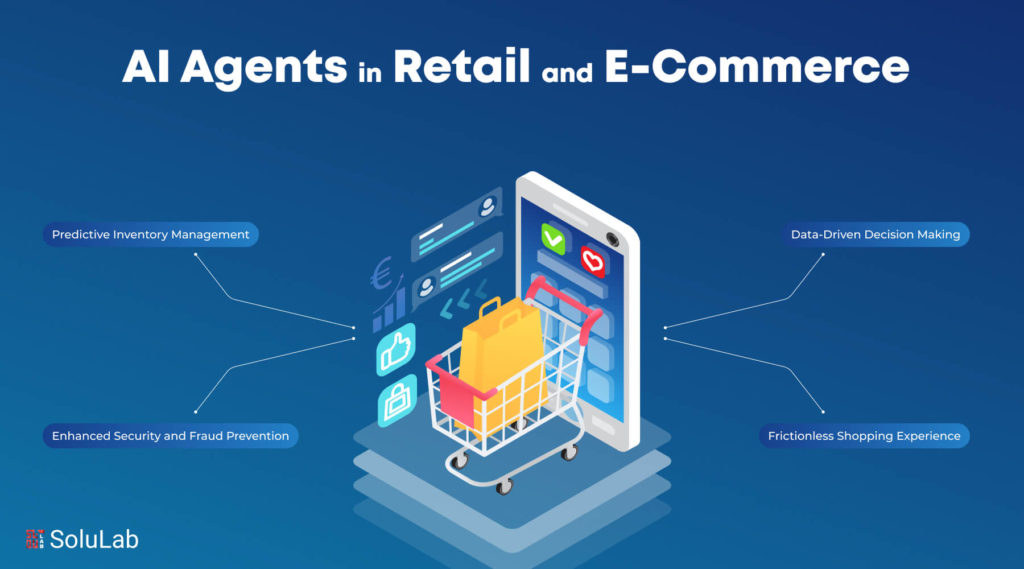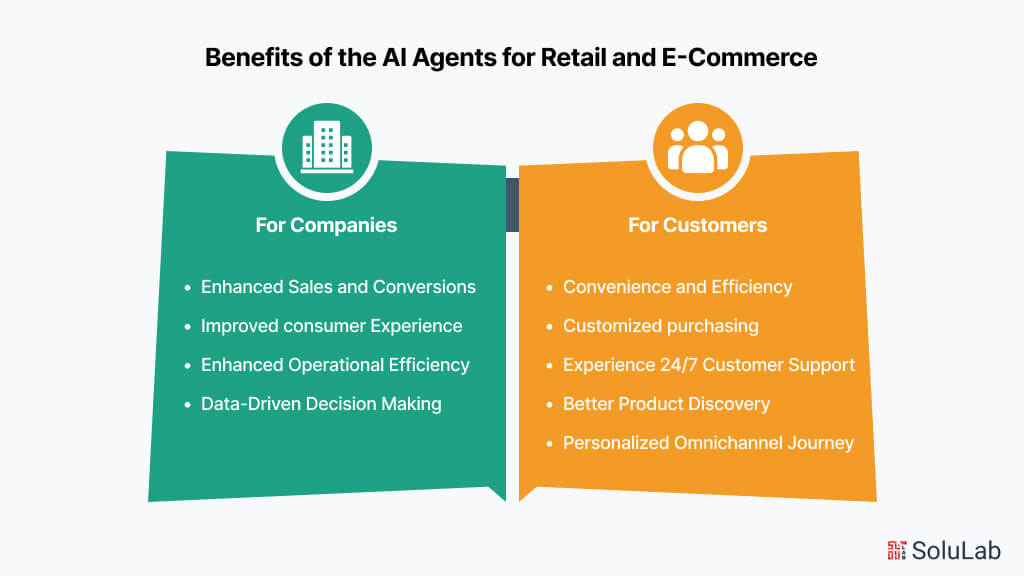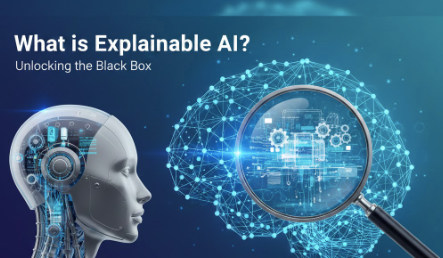
There is a shift of great proportions taking place in the retail and e-commerce industries. The growth of artificial intelligence cannot be ignored. According to a research study, an improved experience has been expected for companies using AI for 50% of consumers demand prompt service, seamless communication, and custom service today and tomorrow. That is where AI bots enter to revolutionize what can be a highly complicated purchase
Understanding AI Agents
Before proceeding to the analysis of the retail revolution, it is necessary to understand what artificial intelligence agents are. These sophisticated computer programs mimic talking, and the physical actions of a person based on the following: Bid a virtual assistant that knows what you want, knows in advance what you prefer, and assists one in the process of shopping. That is an AI agent’s strength.
The Role of AI Agents in Retail
The shop now performs a large assortment of functions other than making sales. Social media is turning into a focal medium for engagement experiences. The way AI Agents in Retail and E-commerce are changing the retail experience is as follows:
1. In-Store Navigation
The AI smart assistants offer enhanced methods of storefront orientation. Consumers can get information about products or pose questions concerning the availability of the goods. It also eradicates the process of having to search for sales personnel when engaging in in-store shopping.
2. Stock Management
AI in E-commerce must assess the sales data and the customers’ tendencies to predict the demand, and consequently enhance the inventory. This procedure is referred to as inventory optimization and stock management. This ensures that stores get the right stock at the right time and eliminates cases of stock shortages and overstocking.
3. Frictionless Checkout
Clients can take the products themselves and complete the purchase without assistance through the self-service terminal based on artificial intelligence. This has eased the checkout process and means that it takes less time to serve customers, as is the case with the regular checkout queues.
4. Customized In-business Promotions
With AI in E-commerce, it becomes possible to track a customer on the business premises using beacons and cameras mounted within the premises. This allows for focused in-store advertising where the client is given a personal offer or a discount.
Role of AI Agents in E-Commerce
Unique facts related to the contemporary environment of buying and selling products online show that the role of AI in E-commerce is being developed comprehensively. An example of how AI is altering the game is shown below:
1. 24/7 Customer Support with Chatbots
How silly to wait to get help when you can simply turn to the help of Zoopla’s app! Some chatbots with artificial intelligence can deal with the return or small issues, as well as answer your questions 24/7.
2. Intelligent Search and Recommendations
Traditional methods of searching through many products listed can no longer be used because of smart search and recommendation engines. Requests in natural language are possible with the help of search engines based on artificial intelligence, and they find related information. While recommendation systems are centered on your browser history and previous transactions to offer you popular products.
3. Dynamic Pricing and Promotions
Using the data of competitors’ prices, market trends, and customer desire, AI agent use cases can dynamically change the prices effectively. This makes it possible for companies to offer what is known as differential pricing, which is a way of offering different clients different prices, hence attracting more clientele in the market and thus enhancing sales.
Read Also: Voice AI Agents In Conversions and Sales
Benefits of the AI Agents for Retail and E-Commerce

There are multiple benefits when employing AI Agents in Retail and E-commerce for both the side of the company and the customer.
A. For Companies
-
Enhanced Sales and Conversions
Effective customer relations, targeted and personal information that is given, and special offers all improve conversion ratios and sales.
-
Improved consumer Experience
AI agents bring fun to shopping, which makes the consumers shop again and again, and hence they are loyal.
-
Enhanced Operational Efficiency
AI stabilizes costs and enhances business performance through cost-effective activities such as a call center, delivery system, and stock control.
-
Data-Driven Decision Making
Big Data consists of big volumes of customer data that Artificial Intelligence processes and analyzes to provide organizations with useful information to improve organizational processes and make efficient decisions.
Read Also: AI Agents for Online Shopping
B. For Customers
-
Convenience and Efficiency
AI agents identify funds and respond to inquiries without the need for clients to expend time and energy, as well as recommend other products pertinent to the client’s interests.
-
Customized purchasing Experience
Buyers benefit from having a purchasing process that is based on user preferences, and in turn are offered more interesting content and recommendations that reflect the use of artificial intelligence.
-
24/7 Customer Support
By implementing AI-powered chatbots, the customer is free from the agony of spending time on a line waiting for an attendant to attend to him/her whenever the customer needs assistance.
-
Better Product Discovery
Thus, AI helps customers find what they are interested in by offering further purchases and products that they are likely to need.
-
Personalized Omnichannel Journey
This is true because of the use of AI agents, blurring the differences between online and offline buying. Through their mobile devices, consumers can make purchases, research products, and get recommendations for products when they go to the store. This helps in getting the buying experience always uniform in every channel.
How are AI Agents Reshaping Retail and Commerce?
The impact of AI agents goes beyond practicality. Here is a breakdown of how it is changing the domain:
1. Data-Driven Decision Making
Internet sales and store sales information are collected by AI in large amounts. This allows the companies to determine the number of products to offer, pricing strategies, the appearance of the shops, and promotions based on statistical information, all of which enhance overall sales and customer satisfaction.
2. Frictionless Shopping Experiences
It equally reduces the complexity of procurement at the various touchpoints. AI agents make quick and less painful shopping achievable and enjoyable; from ‘saying’ the brand and model of a product on the Internet, to ‘checking out’ on your own at the point of purchase.
3. Predictive inventory management
AI allows organizations to harmonize their inventory, in the physical as well as the online outlets that are connected through the company’s supply chain, and the consumer’s needs. Thus, instances of stockout or overstocking are unlikely, while sales and low wastage are likely because the right products are always available when required.
4. Enhanced Security and Fraud Prevention
Stores can employ analytics and cameras powered by artificial intelligence (AI) to monitor and report any form of attempt at theft by consumers. Another capability that belongs to the sphere of online AI is the prevention of fraudulent transactions and the protection of clients and companies.
The Future of AI Agents in Retail and E-Commerce
These new developments that result in better abilities of agents are shaking the very foundations of the modern retail and e-commerce markets. Stating that these talking shopping assistants are not something out of sci-fi, they are here now and are altering how people shop. However, having thrown such labels into the ring in this fluid field what does the future portend for AI agents? Have a look at it:
-
Deeper Personalization and Contextual Awareness
AI will rise from just being a proposing entity to being a recommending one to truly create a unique purchasing experience. Just imagine you are in a store, and after entering it, you greet the in-store assistant who immediately informs you that it recognizes you as one of its regular customers and, based on your previous purchases and current circumstances, can recommend related products. For example, it may recommend shoes or belts to buy alongside the dress that you are buying.
-
Rise of AI-Powered Shopping
The Development of AI-Renowned Shopping Partners. The idea can be readily contemplated to have an online and offline shopping companion that accompanies you in your journeys. This AI assistant may look into the way you shop, suggest products based on what you need at the moment, or help you make a price comparison with other retailers. This way, people will get the advice suited to their needs, and all this will make shopping much easier as well as more informed.
Related: AI on the Fashion Industry
-
Smooth Integration with Augmented Reality (AR)
What AR technology may help to do is radically transform the concept of using objects. It is recommended to use augmented reality (AR) to ‘’virtually” put on clothes or to ‘’try” in advance how furniture will look in a living room. In this way, AI agents will be able to offer recommendations based on your virtual fitting and offer information on the products at the same time.
-
Voice Assistants
It may also be the case that simply picking items off the shelf, and placing them in a shopping cart, or even ordering products online, and getting offers tailored to your needs, could all be done with voice commands at some point in the future. Integrating with voice assistants will enhance availability as well as functionality, and they guarantee that shopping is as convenient as possible.
-
Emotion Recognition and Affective Computing
It is mentioned that AI is advancing in distinguishing human feelings. Imagine an AI agent working in a shop that not only knows you are upset that you cannot find your preferred size fit, but can help you in a snap. Thus, you feel understood when an agent learns about your emotional state, allowing the shopping experience to be adjusted on your behalf.
The Final Word
AI Agents for Retail and E-commerce are changing the way people shop, starting from getting rid of checkouts by verifying the payments to customizing recommendations. Thus, while the future looks bright with prospects such as shopping assistants based on artificial intelligence, integration with augmented reality, and other things, some problems must be dealt with, including data anonymity and ethical questions. However, by utilizing AI agents as wisely as possible, companies can establish a future for shopping not as a mere simple exchange of value for value, but as an enjoyable show.
Are you looking to hire an AI Developer for a solution to several artificial intelligence agents that you don’t know how to control? Well, Solulab is your answer. We can help you develop a correct approach to AI, implement top-level solutions, and ensure that AI utilization is ethical and responsible. Do not let yourself and your business be left out of the revolution of AI. Unlock the best of AI in retail and e-commerce through partnerships with SoluLab. The hope is to create a future where bill paying, or shopping in particular can be fun and where one gets what suits him or her.
FAQs
1. What are AI agents in retail and e-commerce?
AI agents are intelligent software systems that use machine learning and natural language processing (NLP) to automate tasks such as customer support, product recommendations, inventory management, and personalized marketing in retail and e-commerce platforms.
2. What are some common use cases of AI agents in online stores?
Some of the popular use cases of implementing AI agents in online stores include chatbots for customer support, virtual shopping assistants, dynamic pricing engines, AI-based product search and filtering, fraud detection, and automated order fulfillment.
3. How do AI agents improve customer experience in e-commerce?
AI agents offer 24/7 support, personalize recommendations based on browsing and purchase history, provide instant answers to queries, and help reduce wait times during peak shopping seasons. This leads to enhanced customer satisfaction and retention.
4. Are AI agents only beneficial for large retailers?
No, even small and mid-sized e-commerce businesses can benefit. Cloud-based AI solutions offer scalable, affordable tools for improving customer engagement, automating marketing, and streamlining operations.
5. In what ways can SoluLab deploy AI agents in my business?
SoluLab is a leading name for AI agent development tailored to your unique business needs, such as intelligent chatbots, personalized recommendation engines, inventory automation tools, and predictive analytics systems. Their team also ensures seamless integration with your existing digital ecosystem.






